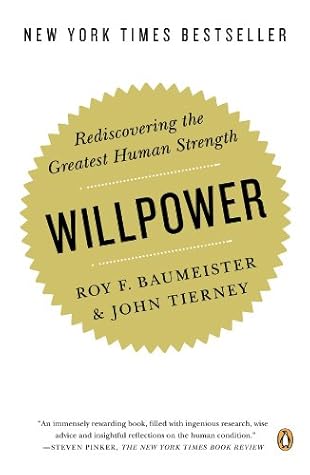More on this book
Community
Kindle Notes & Highlights
“Thank heaven, I have given up smoking again!” he announced. “God! I feel fit. Homicidal, but fit. A different man. Irritable, moody, depressed, rude, nervy, perhaps; but the lungs are fine.”
1. You have a finite amount of willpower that becomes depleted as you use it. 2. You use the same stock of willpower for all manner of tasks.
If you can manage to eliminate or moderate your addiction, your future horizon is liable to expand,
Those who’d written about unfulfilled tasks had more trouble keeping their minds focused on the novel—unless they’d made a specific plan to complete the task, in which case they reported relatively little mind wandering and scored quite well on the reading comprehension test.
Instead, the unconscious is asking the conscious mind to make a plan. The unconscious mind apparently can’t do this on its own, so it nags the conscious mind to make a plan with specifics like time, place, and opportunity. Once the plan is formed, the unconscious can stop nagging the conscious mind with reminders.
“Closing a door on an option is experienced as a loss, and people are willing to pay a price to avoid the emotion of loss,”
Men who saw photos of hot women shifted toward getting an immediate reward instead of waiting for a larger payoff in the future. Apparently, the sight of an attractive woman makes men want cash right away.
As Madonna advised in “Material Girl”: “Only boys who save their pennies/Make my rainy day.”
RescueTime
For contentment, apparently, it pays to look at how far you’ve come. To stoke motivation and ambition, focus instead on the road ahead.
People care more about what other people know about them than about what they know about themselves.
you’re suffering from what psychologists call misregulation, the mistaken belief that buying something will regulate your mood for the better, when in fact you’ll just feel worse afterward.
Exercising self-control in one area seemed to improve all areas of life.
Once you start exercising, you feel virtuous and therefore entitled to reward yourself with high-calorie treats.
I have self-discipline in work, but I have none in my life sometimes.”
At home these men had no cause to show their natural savagery . . . they were suddenly transplanted to Africa & its miseries. They were deprived of butcher’s meat & bread & wine, books, newspapers, the society & influence of their friends. Fever seized them, wrecked minds and bodies. Good nature was banished by anxiety. Pleasantness was eliminated by toil. Cheerfulness yielded to internal anguish . . . until they became but shadows, morally & physically of what they had been in English society.
A modern Odysseus can try lashing himself to his browser with software that prevents him from hearing or seeing certain Web sites.
The clear implication was that the best advice for young writers and aspiring professors is: Write every day. Use your self-control to form a daily habit, and you’ll produce more with less effort in the long run.
Contrary to popular stereotype, alcohol doesn’t increase your impulse to do stupid or destructive things; instead, it simply removes restraints. It lessens self-control in two ways: by lowering blood glucose and by reducing self-awareness.
People who are subliminally exposed to religious words like God or Bible become slower to recognize words associated with temptations like drugs or premarital sex.
We can ignore temptations when they’re not immediately available, but once they’re right in front of us we lose perspective and forget our distant goals.
Children who had a father in the home were far more willing than others to choose the delayed reward.
That marshmallow experiment caused some researchers to conclude that controlling attention is what matters, not building willpower, but we disagree. Yes, controlling attention is important. But you need willpower to control attention.
It takes willpower to turn down dessert, but apparently it’s less stressful on the mind to say Later rather than Never.
people exert less self-control after seeing a messy desk than after seeing a clean desk, or when using a sloppy rather than a neat and wellorganized Web site. You may not care about whether your bed is made and your desk is clean, but these environmental cues subtly influence your brain and your behavior, making it ultimately less of a strain to maintain self-discipline. Order seems to be contagious.


